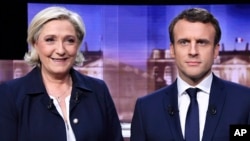The final debate between the two remaining candidates in France’s presidential election took place Wednesday. The country will vote in the historic election Sunday.
The presidential election is the first in which France’s traditional parties are not represented.
The vote could decide if France stays in the European Union.
Observers say the vote suggests there is a high level of anti-establishment feelings among French voters.
In the first vote on April 23, En Marche! party candidate Emmanuel Macron received 23.8 percent of the vote. National Front candidate Marine Le Pen received 21.5 percent. That was enough to send the two non-traditional candidates to the final election on May 7.
Eleven candidates took part in the first vote. Current President Francois Hollande chose not to seek reelection because of his low popularity among voters.
Marine Le Pen is the candidate of the very conservative National Front party. The 48-year-old candidate is currently a member of the European Parliament.
Le Pen has called for stronger border controls and has shown opposition to immigrants and foreign cultures. She also has criticized free trade and suggested that France should leave the European Union.
Emmanuel Macron started his own party last year. The 39-year-old served as France’s economy minister. Before that, he was an investment banker. Macron supports France’s membership in the EU and has said he is pro-business. His support is found mainly in cities.
During Wednesday’s debate, Le Pen described Macron as weak on terrorism. Macron accused Le Pen of being a dangerous extremist.
The candidates discussed France’s high unemployment rate. Macron called for reducing government rules on business. He also called for policies designed to help create more small and medium-sized businesses.
Le Pen promised to tax the products of companies that outsource jobs in France to other countries.
Terrorism was another major issue in the debate. France has had several deadly terrorist attacks in the last two years. The violence killed more than 240 people. The country remains under a state of emergency.
Le Pen called for closing Muslim religious centers, or mosques, suspected of supporting extremism. She said she wants to expand prisons and increase border security.
Macron called for increasing surveillance of online activity, more police officers and better sharing of intelligence.
About 18 percent of French voters are estimated to be undecided. Wednesday’s debate was the last chance for them to decide on who to support.
One public opinion study showed Macron with 60 percent support to Le Pen’s 40 percent.
Le Pen’s party has long faced criticism for extreme positions on immigration and religion. Le Pen ousted her father, Jean-Marie Le Pen, from the leadership of the National Front party because of his extreme positions.
After the first vote in April, Le Pen gave up leadership of the party saying she wants to be “above partisan considerations.”
Macron, once a member of the Socialist Party, was the economy minister in the unpopular Francois Hollande administration. But the candidate has largely escaped public frustration with that party.
I’m Mario Ritter.
Marissa Melton and Smita Nordwall reported this story for VOA Learning English with additional material from AP. Mario Ritter adapted it for VOA Learning English. Caty Weaver was the editor.
We want to hear from you. Write to us in the Comments section, and visit our Facebook page.
_______________________________________________________________
Words in This Story
anti-establishment –adj. to be against established institutions like government, traditional parties or other groups
outsource –v. to have workers in another country do a job that used to be done in one’s home country
surveillance –n. the act of watching someone or something carefully, especially in connection with law enforcement
partisan –adj. to strongly support a side, party or leader
frustration –n. a feeling of anger or annoyance caused by not being able to do something






